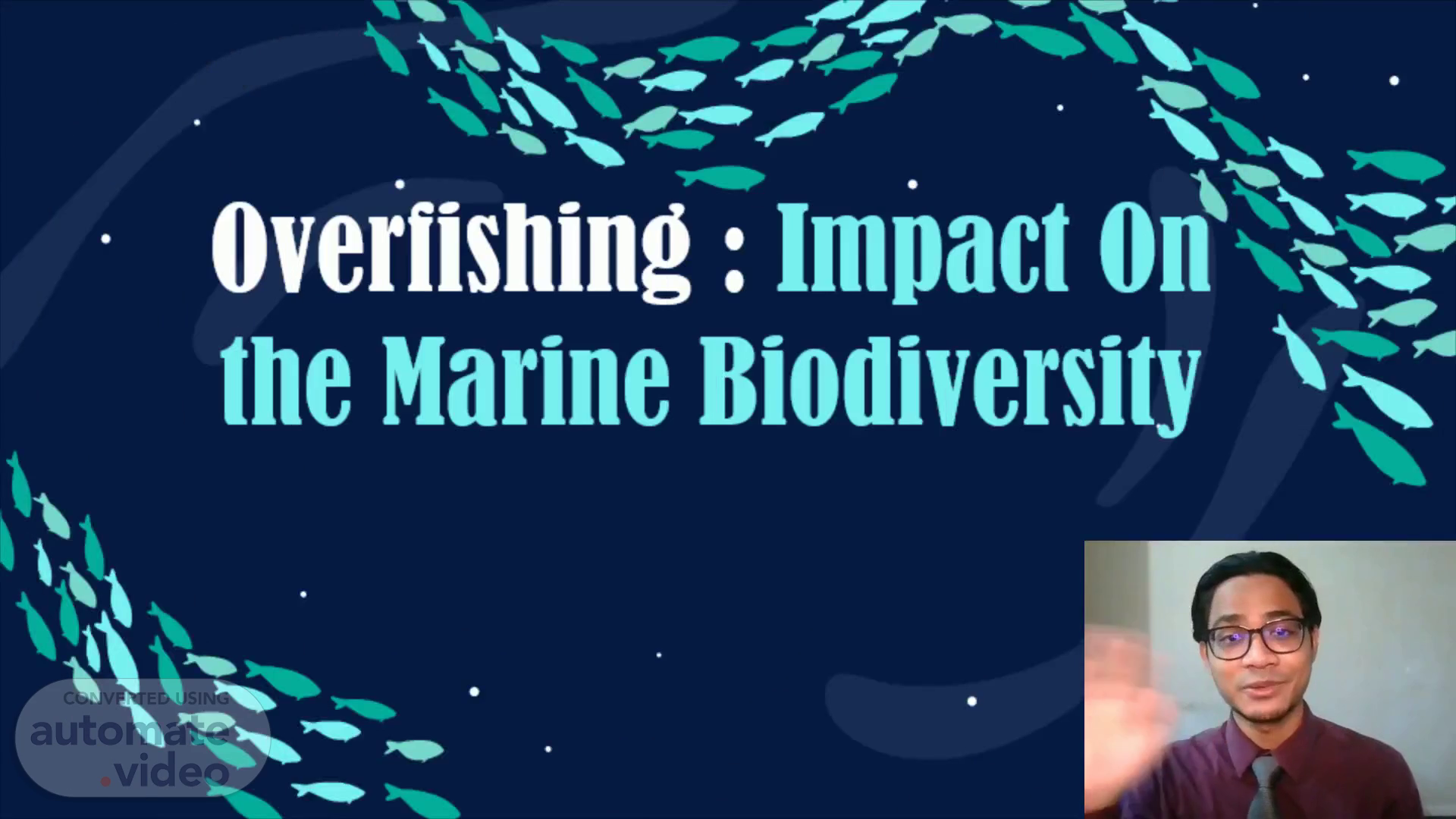
Overfishing : Impact On the Marine Biodiversity
Scene 1 (0s)
Overfishing : Impact On the Marine Biodiversity. Prepared by: 1) Muhammad Hafiz Bin Ibrahim (2021834578) 2 ) Muhammad Nazmi Bin Sobri (2021470904) 3) Amirul Haziq Bin Zainudin (2021117403).
Scene 2 (14s)
Objectives. 01. 1) To discuss what is overfishing. 2) To identify the impact of overfishing on the marine biodiversity. 3) To determine the solutions to overcome overfishing problem..
Scene 3 (36s)
Significance of study. 02. 1) To spread the information about the overfishing. 2) To spread awareness among the people about the impact of overfishing on the marine biodiversity. 3) To encourage people to take care of the ocean..
Scene 4 (1m 2s)
Problem Statement. 03. Due to the damage done by overfishing goes beyond the marine environment had caused the serious negative impact on the marine biodiversity. The question is how does overfishing affect the marine biodiversity?.
Scene 5 (1m 22s)
Introduction. Fishing is the act of catching fishes or other aquatic organism, usually with rod, line and hook . Fishing can be considered as human’s activity since ancient times as a means of providing food to them for their survivability. There are five basic methods of fishing which are fly-fishing, bait fishing, bait casting, spinning and trolling (Keating et al., 2021). However, fishing is one of the leading causes of population decreases in marine species..
Scene 6 (2m 6s)
Fishing is not intrinsically harmful to the ocean, except when humans catch fishes faster than stocks can replenish which is known as overfishing Overfishing occurred when a stock was 1/50th of the abundant biomass ( Beverton et al., 1994 )..
Scene 7 (2m 31s)
The innovations in fishing equipment and methods have made it possible for commercial fishing operations to catch more fish at once . Illegal , unreported, and uncontrolled fishing also contributes significantly to dwindling fish supplies and habitat devastation in the ocean. The question is how does overfishing affect the marine biodiversity ? In this video, our focus will be on the extinction of marine species, alter in marine food chain and destruction of marine habitat..
Scene 8 (3m 32s)
Impact of Overfishing on the Marine Biodiversity.
Scene 9 (3m 50s)
Overfishing lead to marine species extinction. Cause : the number of fish exploited is more than the number of fish that need to be replenished Statistics shown that increasing demand in the food industry is actively selling more seafood than land food International Union for Conservation of Nature (IUCN) has reported, uncontrolled fishing has caused nearly 17.4% of the 1041 endangered species S tudies show nearly half (46.8%) lack species data (DD ) D eficient marine species becoming increasingly extinct If this happens continuously and without control, the probability of the number of marine species becoming extinct increases in a short period of time..
Scene 10 (4m 49s)
Overfishing alter marine food chain. When the food chain has been altered, then the number of predators and prey becomes unbalanced and disrupts the marine ecosystem (McClanahan et.al, 1995 ) Example : Shark (highest threat of extinction ) Without sharks, ecosystems in the ocean become unbalanced United States the main source of protein for them is fish instead of meat U.S. Department of Health and Human Services and the USDA recommends that Americans double their seafood intake ( Nylen 759 ) M ore people can afford to buy a wide variety of foods, including more quality and unique fish options (Shaver and Yozell 10 ) - shark become favourite choice.
Scene 11 (5m 44s)
Overfishing destroy marine habitat. 1) Trawling is one of the most common fishing methods used along the world's coastal oceans. Affects the sea floor. Stir up sediments which can alter nutrient cycle. Permanently destroy habitat. Deplete certain species affecting the food chain. Bottom trawling can permanently destroy habitat such as coral reefs and benthic sediments 2) Destruction of mangrove areas due to development of aquaculture farms. Support a diverse range of wildlife and coastal fisheries. Ensure shoreline stability Have been razed to build aquaculture farms. Destroy nesting ground and shelter area for fish, shrimp and cockles..
Scene 12 (8m 22s)
Solution to Overfishing. 01. Establish marine protected areas. Protect diverse and important areas to species replenishment. Feeding grounds and nesting spots..
Scene 13 (9m 47s)
In conclusion, it is important for us to learn and understand about issue of overfishing that can have a huge serious impact on marine biodiversity, so that we can find an initiative to correct the problem and help the ocean to recover from the damages caused by human’s greed. It is undeniable that fish is one of the world's healthiest foods and important food source for humans but they also play an important role as nutrient providers to marine ecosystem. Overfishing can affect the marine biodiversity as this activity can lead to species extinction, alter marine food chains and cause habitat destruction. However, if we act quickly to address this issue, rather than taking our time and waiting for things to get worse, we can still solve the overfishing issue..
Scene 14 (10m 56s)
THANK YOU!!.
Scene 15 (11m 7s)
Bibliographical references. Beamish, R. J., McFarlane, G. A., & Benson, A. (2006). Longevity overfishing. Progress in Oceanography, 68 (2-4), 289-302 . Keating, F. E. , Petri, . Robert Lee and Thomas, . Terence Barrington (2021, January 21). fishing. Encyclopedia Britannica. https:// www.britannica.com/topic/fishing-recreation Thrush , S. F., & Dayton, P. K. (2002). Disturbance to Marine Benthic Habitats by Trawling and Dredging: Implications for Marine Biodiversity. Annual Review of Ecology and Systematics , 33 (1), 449–473 . Valentine, J. F. &Heck K. L. (2005). Perspective review of the impacts of overfishing on coral reef food web linkages. Coral Reefs, 24 (2), 209-213 . Wong, H. S., & Yong, C. C. (2020). Fisheries regulation: A review of the literature on input controls, the ecosystem, and enforcement in the Straits of Malacca of Malaysia. Fisheries Research, 230 , 105682..